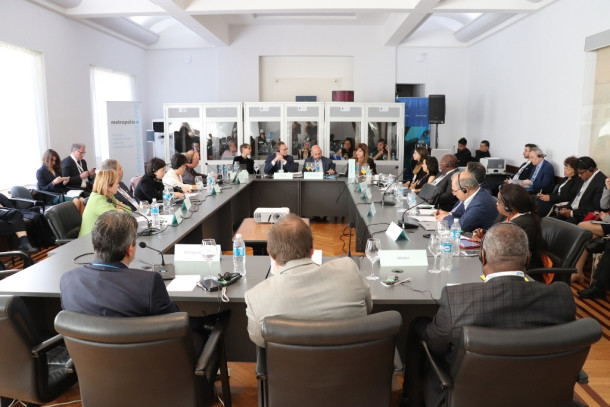
Co-creating urban spaces with all citizens, the key to sound metropolitan governance
Board of Directors members discuss strategies and approaches to enhance civil engagement and promote policies to advance the right to the city across their metropolises
As part of the program of the last Metropolis statutory meetings in Montevideo, eleven political representatives of our Board of Directors participated in a table of open discussions regarding how metropolises can best develop and implement intersectional initiatives that foster inclusion and empower citizens to act in the places where they live, as well as invoke a sense of shared responsibility with local governments.
The leaders from Abidjan, Barcelona Metropolitan Area, Berlin, Buenos Aires, Dakar, Guangzhou, Mashhad, Montevideo, Montréal, Porto Alegre and Santiago debated how positive engagement with and by the people who live in metropolitan spaces is critical for their mandates.
The following questions were provided as starting points for the debate:
- How can we best institutionalize the civil engagement of all residents for effective metropolitan governance?
- In which fields of urban development – for example, climate change adaptation, housing, mobility, or education – is civil engagement most needed?
- How can we best connect with those citizens who are particularly threatened by an issue and who are sometimes hard to reach?
- Can digital technologies provide a means for local governments to foster good civil engagement?
- What are the limits of civil engagement? Where does the authority of the local government need to be maintained – transparently and clearly?
- How can we handle situations in which the private sector commercializes forms of civil engagement?
The participants agreed that levels of engagement do vary and a combination of strategies must be taken into account. Where people want to participate more, there is also a growing demand of freedom and flexibility in the ways they can participate. On the other hand, there are people who do not want to “waste their time” to participate. Therefore, in order to leave no one behind, it is important to count on different methods of engagement, ranging from regular elections and traditional methods of consultation with sectors of stakeholders, to open sourced online platforms and tools that open the governments to the broadest audiences.
Another conclusion of the debate is that enhancing civil engagement and drawing different constituencies (whether they are electors or not) into facilitated public dialogue can foster the structural inclusion of vulnerable groups into all dimensions of public life. It can lead to the promotion of policies targeting poverty, gender inequality, education gaps, and health issues that advance the right to the city, and thus to the compliance with the global agendas that we take as a reference for sustainable development – the Agenda 2030 and the New Urban Agenda.
This policy debate edition was held on the morning of April 6 as one of the inaugural sessions of the day of statutory meetings of Metropolis and fellow local government networks (UCLG, UCCI and Mercociudades) in Montevideo. This session was co-organized by the Metropolis Secretariat General, the Governing Mayor of Berlin in his role of President of Metropolis, and the Intendencia of Montevideo as the host of the 2019 Metropolis statutory meetings. Technical inputs from Metropolis’ members were provided by the preliminary outcomes of the Metropolis pilot project “Sustainable Cities Collaboratory”.
The Metropolis Policy Debate series provides the political representatives of our Board of Directors with an opportunity to exchange ideas and solutions related to metropolitan challenges. The latest policy debate on civil engagement followed the first edition that took place in Gauteng in 2018, as part of the Metropolis Annual Meeting, with the theme “Inclusive Metropolitan Cities and City-Regions”.

